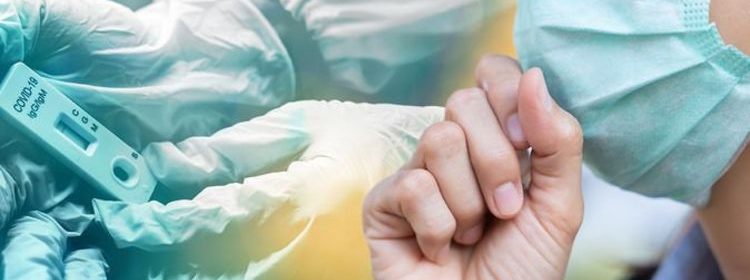New test can detect your immunity to COVID-19 post-vaccination – how protected are you?

UK coronavirus cases increase by a further 39,906
We use your sign-up to provide content in ways you’ve consented to and to improve our understanding of you. This may include adverts from us and 3rd parties based on our understanding. You can unsubscribe at any time. More info
Cases of coronavirus fell for the fourth consecutive day on Sunday and the unprecedented vaccination effort is bound to have contributed to the positive trend. The threat posed by coronavirus still persists, however. A new variant is under investigation by Public Health England (PHE). The perennial threat of new variants means it is important that the immunity conferred from the vaccines is constantly monitored.
Today, Luas Diagnostics, a company that specialises in the development, manufacture and marketing of rapid tests, has launched an immunity test that can aid this important effort.
The product, which is manufactured by Chembio Diagnostics Systems of New York, uses a finger prick of blood for the “detection, differentiation and quantification of IgM and IgG receptor binding domain (RBD) antibodies to SARS-CoV-2”.
RBD is the main target for neutralising antibodies so identifying its presence can help to determine one’s level of immunity to the pathogen.
The results are read and stored in a portable reader which provides semi-quantitative results in either laboratory or remote settings.

The total time to result is 15 minutes and the antibody response is represented numerically.
William James, Professor of Virology at the Sir William Dunn School of Pathology at the University of Oxford said: “Antibodies in the blood, induced either by SARS-CoV-2 infection or, even more importantly, by vaccination, are critical in protecting people from future infection and severe Covid19 disease.
“It is clear that the higher the concentration of specific, anti-SARS-CoV-2 antibodies in the blood, the higher the level of protection. We now know that immunisation with the approved vaccines generates high levels of antibody that provide good levels of protection against infection.
“This is why we recommend everyone who can, should get vaccinated at the earliest opportunity, and why it is so important to make vaccines available across the world.”
DON’T MISS
Arthritis diet: Three best drinks to reduce risk [TIPS]
James Martin discovered his health condition at 30 [INSIGHT]
High blood pressure: The purple drink that lowers BP [ADVICE]
Prof James continued: “The availability of a simple and rapid blood test that can quantify antibody levels is therefore an important factor in monitoring the likely level of immune protection in both convalescent individuals and vaccinees and could be useful in decisions on whether and when to give booster jabs.
“Being able to distinguish the IgM from the IgG class of antibody response will also provide potentially useful information about the stage of a person’s immune response, and its likely persistence over time.”
Brendan Farrell, CEO of Luas Diagnostics, added: “We are excited to form a partnership with Chembio to market their test to determine antibody response post infection or vaccination.
“A recent study has shown that 10-15 percent of people, particularly among the higher age group, may not produce antibodies even after the second dose of vaccine and thus may have limited protection against the virus.”

Current testing approaches
There are different tests you can get to check if you have coronavirus (COVID-19).
The test you need depends on why you’re getting tested.
The two main tests are:
- PCR tests – mainly for people with symptoms, they’re sent to a lab to be checked
- Rapid lateral flow tests – only for people who do not have symptoms, they give a quick result using a device similar to a pregnancy test.
Both tests are free.

Get a PCR test as soon as possible if you have any of these symptoms, even if mild:
- A high temperature
- A new, continuous cough
- A loss or change to your sense of smell or taste.
According to current public health advice, you and anyone you live with should stay at home until you get your test result. Only leave your home to have a test.
Anyone can now get regular rapid lateral flow tests without having symptoms.
“About one in three people with COVID-19 do not have symptoms but can still infect others,” explains the NHS.
Source: Read Full Article